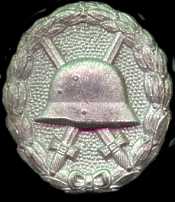| The history of the German wound badge dates back to World War I. Kaiser Wilhelm II established the
first German Military Wound badge (Verwundetenzbzeichen) on March 3rd, 1918, with a the declaration stating that it
would be presented in 3 grades. It was to awarded in black for one to two
wounds, in silver for three to four wounds, and in gold for five wounds or
more. In cases of severe wounds the higher class was presented. The Imperial Wound badge was
to provide the basis for ones issued during World War II. It was an oval
badge with laurels surrounding the edges and a ribbon at the base. In the center
of the badge is an Imperial helmet,
with a pair of swords behind it. The background of the center is pebbled, though
in one variation the background of the badge is hollowed. The silver
grade of the Imperial Wound badge is pictured to the right. |
 |
On June 3rd, 1918, the Bavarian War Ministry
declared that the Wound Badge was an “award”, not a “decoration”, and on June
24th the Kaiser introduced the Naval Wound Badge, which was to be awarded in the
same grades as the Army and under the same regulations. Due to the late nature
of the creation of the award in relation to the war, many soldiers who were
wounded never received their badges, a situation that was not fully remedied
until after the collapse of the Weimar Republic.
On January 30th, 1936, with Hitler in power and the Army gaining full
momentum , the Ministry of Interior issued a declaration
stating that all those who were wounded during World War I and never received
their Wound Badge could now do so through the proper channels. They would also
receive the proper documents, which would in turn allow them to wear the badge
officially and in public. Still on April 20, 1939, after the annexation of
Austria, the Sudetenland, and Memel, the Ministry of interior issued a
declaration stating that all those who served in the Austro-Hungarian Army and
were wounded in action during World War I would also be able to receive the
award. In fact, these awards were presented until late 1941.
